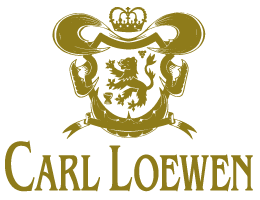Carl Loewen

Country: |
Germany |
Region: |
Mosel |
Sub region: |
Liewen |
Year founded: |
1803 |
Owner: |
Loewen Family |
Winemaker: |
Christopher Loewen |
Organic: |
Practicing Organic |
website: |
https://www.skurnik.com/producer/loewen/ |
Basic Info
The Carl Loewen estate dates back to 1803 when an agent in Paris purchased a set of vineyards and buildings owned by the Maximin order. This sale was part of an auction used to generate money for the Napoleonic government after secularization. Weingut Carl Loewen has grown over the past three generations from 1ha to 15 today. The estate is currently run by Christopher Loewen and his father Karl-Josef. in the late 1980s and 1990s, Karl -Josef was always looking for old vineyards and grew the Estate by purchasing steep old vineyards (low yielding) that no one wanted to work anymore. Now the estate is spread over 4 villages – Leiwen, Longuich, Detzem, and Thörnich. More than 50% of the holdings are ungrafted, very old vines, from 60-120 years old, and on steep slopes. In 1998, Karl-Josef bought his first parcels in the Thörnicher Ritsch vineyard, the second steepest vineyard in Germany, second only to Bremer Calmot in the lower Mosel. Karl-Josef had visited a wine fair in Thörnich and felt that the quality of the site, which is grey weathered slate and quartzite, was very high, but there was a sharpness, a green flavor, similar to Saar wines that he found. One of the first things that he did in this site was to cease the use of chemical fertilization. This is an important step and one that is taken immediately when vineyards are purchased by Loewen. Christopher notes that it takes many years for a vineyard to recover from these treatments and to come into balance; the first vintage that the winery made a dry wine from this site was 2008, a full ten years later. Part of the green flavor in vineyards with higher levels of fertilization is attributed to nutrition. Higher levels of nutrition make berries bigger, which in turn leaves less airspace between grapes, which means more moisture and an earlier onset of botrytis. Earlier botrytis means that the affected bunches must be harvested earlier, resulting in green, hard flavors.

